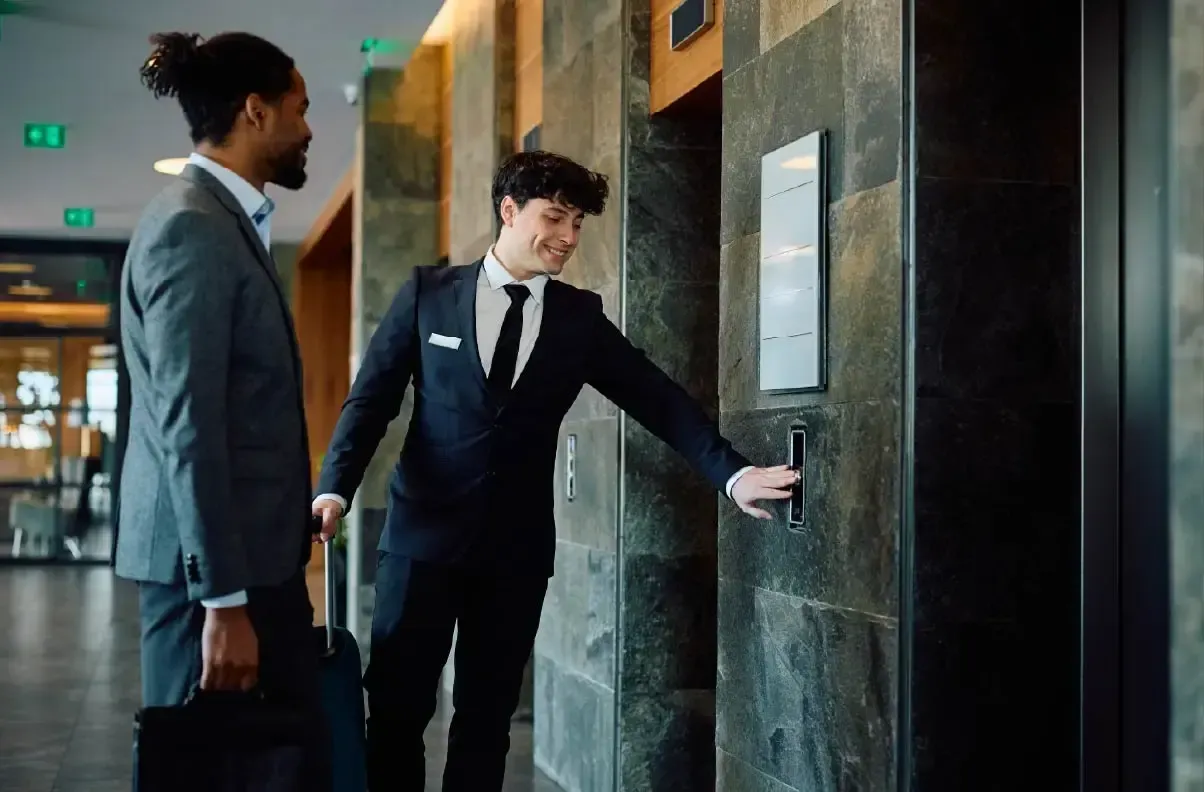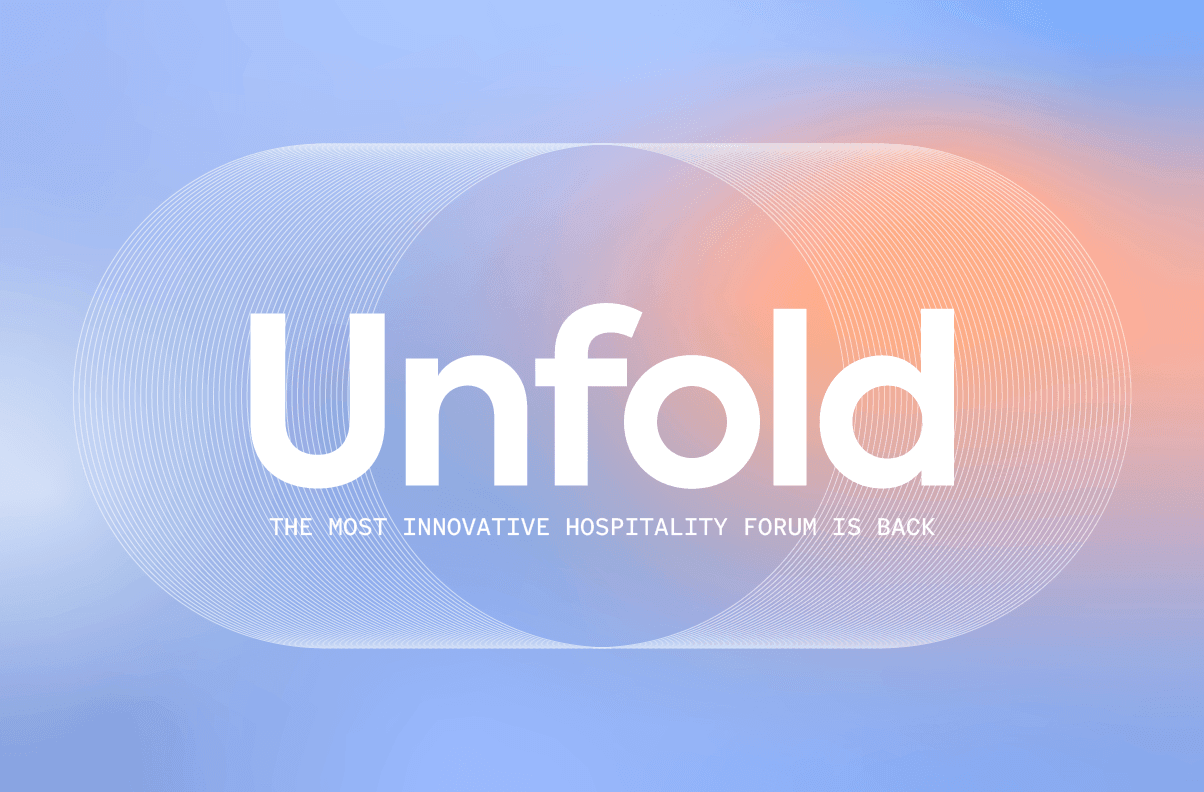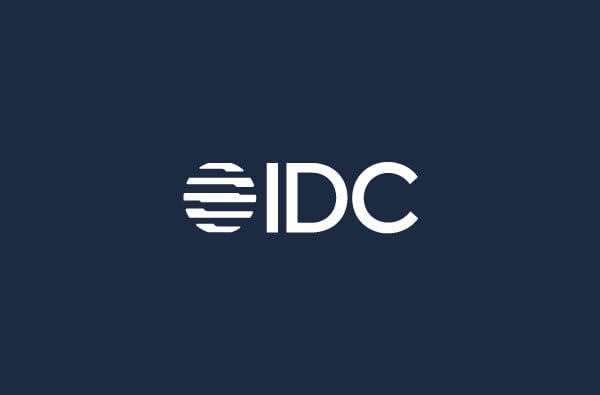Session two of Unfold was a discussion around Hospitality Tomorrow: Rethinking the Industry. We recruited four of the biggest brains we could find to join us – plus Matt – to cover everything from the influence of technology to changing buyer behavior.
You can view the webinar as live right here, or you can read on for some written highlights. Joining Matt the moderator, we had:
- Steven Haag, Managing Director, Saco – Edyn
- James Lemon, Founder & CEO, Otolo (Partner, The Growth Works)
- Carla Milavanov, SVP Global Technology and Customer Services, Accor
- Vassilis Syropoulos, CEO, Juyo
How is technology forcing hospitality’s evolution?
For a long time, hospitality was able to retain a comfortable status quo. But we’ve reached a tipping point where it’s impossible the power that technology has to help our industry evolve. So where should hoteliers begin?
As Carla says, you need to reset the foundations first: “We wanted to start with quick wins, where we can really accelerate savings. Today, hospitality is super traditional, especially in brands like Accor. Moving to the cloud is basic, but making that happen is not just shifting technology: it’s shifting process, the behavior of your teams and expectations of customers.
“Cloud for us is something that must happen. It’s going to really help our industry to go faster, save costs, and be agile. During the pandemic we had to update our systems many times, but all the servers were located in a computer room in the hotel. Things like that are forcing us to move forward. A strong foundation gives us pace for innovation.”
Vassilis highlights the importance of your hospitality cloud and says this first step can be the hardest. “You should start with a heart transplant,” he said. “A heart transplant is moving to the cloud with a PMS – that’s the first thing you should do. Then you need to start thinking about what has the highest impact in terms of customer satisfaction, in terms of contribution to the bottom line, in terms of improvement in your key metrics.”
There can be a temptation to try and change everything at once – to think of hotel transformation as all or nothing. But this strategy can overwhelm you. Once you have the fundamental building blocks in place – once the heart transplant is done – improvements can come in iterations. As Vassilis says: “The advice I give to hoteliers is don’t try to boil the ocean. Just make small increments every day.”
Understanding guests and understanding tech
We often talk about hospitality’s evolution as though it’s a given. That an abundance of tech and a general willingness to modernize means that every hotelier is ready to make sweeping changes. But James says it’s not that simple: “There’s a goldrush of technology out there... As a hotelier, that does not make it easier.”
As well as all the preparation, questions to ask and due diligence when changing a PMS or other tech provider, many properties also have depleted teams at risk of burn out. “Everyone is open to change but getting it done is hard. That’s the industry’s biggest sticking point: we don’t really know what to do next.”
Of course, there are plenty of hoteliers who are already embracing cloud technology. What should be their next focus? Steven and his team at SACO already did their ‘heart transplant’ by moving to Mews – they now plan to get to know their customers better.
“We want to start owning the customer from a technological side of things. Everybody is taking a myriad of OTAs and other types of bookings where we’re not getting true ownership of the customer, and unpicking that to get a more direct relationship – not just direct bookings but starting to understand who that person is – is going to be a real focus as we start marketing again and pushing loyalty programs.
“The most important thing is that you have someone whose dedicated job is to own digital guest experience. Ideally, they have a project management background but also know hospitality so they can understand not just the cold hard math behind it, but really what it takes to deliver a soulful guest experience that’s applied digitally.”
People are just as important as technology
Not everything revolves around tech. As James points out: “Forced evolution is a great topic but it’s got to start with people and mentorship and growth rather than technology.” Specifically, that means empowering your teams to grow and make a positive difference. “People will not work in hospitality if they think their job’s going to be the same two years from now. But if you give them a proportion of your time to work on a project that they’re excited about, that they want to build skills in, and will also help your hotel, you have a real chance.”
Small projects across cross-functional teams, whether that’s helping to improve your property’s sustainability credentials or picking a new specialist software, are a great way to build engagement and ensure you beat the war on talent in hospitality.
Vassilis concurs: “You need to provide them with a job that touches many different things; they can host, they can be busy with all elements of hotel management, they can express their personalities... Technology is the enabler.”
The growing need for employee buy-in is something that we’ve also experienced at Mews. As Matt says: “You have to put the effort to understand what the experience will be for an employee coming into your company, and what their journey will look like over the next few years. Internally at Mews, we use a lot of mentoring platforms. Yes, they can cost, but it’s worth it in terms of ROI because it really helps with employee retention.”
How has buyer behavior changed in hospitality and beyond?
1. Longer stays
One of the trends we’ve seen (and that Matt and Richard spoke about in their opening Unfold session) is that the length of stays are getting longer. Long-stay specialists SACO, has adapted by creating a new brand to capture these guests. Here’s Steven talking about their decision:
“SACO is one of the pioneers in serviced apartments; we’ve been around for over 20 years specializing in corporate medium to extended stay guests. What we’ve seen pre-Covid but certainly accelerated by Covid is a lengthening of stay.
“What we’ve done is created a new brand, Cove, which is targeted at not just traditional corporate guests but at leisure guests as well. It’s a serviced apartment but not as you know it; it has a certain look and feel that’s more like a home and somewhere you can work, sleep, eat – live your life in all modes. More and more the modern guest is fitting this mold.”
This could also lead to a significant reshaping of the industry as a whole. As Steven points out, “investors now understand serviced apartments much, much better,” and the last 18 months have effectively alerted people to the viability and big gain potential of this business model.
2. Larger groups, longer periods, more space
Another trend is that more people are traveling together, perhaps because of a need to be sociable after months cooped up. This has a knock on effect when it comes to maximizing your space.
“People are traveling more with other people,” says Steven. “You’re getting a higher occupancy per key than any time since we’ve been counting. And they’ve been traveling for longer periods. If you have more people staying in a space for longer, they need more space. That’s the key underlying feature we’re seeing coming out of the pandemic.
“They also need a space that works in many different ways – what we call ‘life and all’ modes. I need my space to act like an office, a place where I can have friends over, and where I can veg out in front of the TV and eventually go to sleep. The brands that are going to capitalize are the ones that offer that extra element of space that a traditional 18m2 hotel room just doesn’t have.”
Thinking about your space creatively may give you a headache, but the rewards can be significant. And you don’t only need to think in terms of room space – public space can also play an important role.
As Carla says: “Even the traditional brands are thinking how we can do hotels differently, but we’re looking beyond the room, thinking about public space and experience. For the most traditional brands we joined with additional services that are linked to F&B experiences, common workspaces, and extended kitchens.” For instance, Accor ran a great program with their kitchen. Because the kitchen was closed most of the time, they opened it up to other chefs and companies to use and were able to bring in additional revenue while also providing a helpful service.
3. The need for multiple guest journeys
In terms of guest behavior during the journey, there’s a growing familiarity of technology even in older generations. Plenty of grandparents are comfortable using apps or booking rooms online – but of course there are still some who prefer to call to make a reservation, to walk into a high-street travel agent, and to speak to your front desk staff when they arrive.
Ultimately, you have to have different pathways. “I use the example of airlines all the time,” says James. “A lot of older people know exactly how their BA app works, but they don’t have to use the app – you can turn up with a paper boarding pass, or you can even turn up with no boarding pass if you've booked via a travel agent. They’re not shutting down options if you want to check in at an airport, they’re saying if you want to go straight through it’s what we prefer – it’s a gorgeous experience – but you can still use different methods.”
Will business travel ever be the same?
And so we come to the thorny issue of business travel. After a brief resurgence, numbers are dropping again as more travel restrictions reappear. What does the future hold?
“Someone told me that business travel is binary,” explains Vassilis. “If I’m a salesperson and I go on the road, then my competitor also needs to go on the road, because my competitor can’t just do a Zoom call.”
But there will be change in the long term. He continues: “The nature of business travel will be different. You’ll make your travel more purposeful. We were surprised to see the surge in demand for meetings. We’ve been debating a lot about the hybrid environment, but in the long term I’m very optimistic about the meeting industry, because it really boils down to our human nature – we love making connections and getting inspired.”
Of course, not all business travel is alike. Plenty of business travel is still ongoing because it’s part of essential work – often something manual or government related. It’s the more ‘casual business market’ that James says is likely to suffer, perhaps by around 20% in the long term.
Your sales team need to be proactive in discovering what’s happening to the sector in your local area (are the companies in buildings near you welcoming foreign offices?), as well as trends from around the world. And as James advises: “If you’re not sure what’s going on in your business travel space, get a mentor, join communities of salespeople who are discussing this stuff.”
Bridging the knowledge gap between hoteliers and tech companies
We usually talk about technology like it’s second nature. Perhaps we can be guilty of assuming that everyone has at least a decent level of understanding about what software they want to use and why. But if you’ve been using a legacy system for decades, it can be hard to know where to begin when it comes to modernizing.
So what’s the best way to bridge that knowledge gap? The Growth Works specialize in this topic, and James has three answers:
1. Check peer-led review sites like Hotel Tech Report to see what your peers recommend – and if you use a solution, leave your review because it will help someone else
2. Work with an objective consultant whose only motivation is to help you get your hotel working, whether that’s with new technology or your existing stack
3. Upskill your teams with training and mentorship schemes so that they can drive change from within while increasing their loyalty to your company
If you’re thinking of trying a new solution like a revenue manager or upselling tool, don’t be shy to ask for a month’s free trial. If the software is in the cloud (which it should be) then integration is often pretty simple, and you can easily switch off the tool if it isn’t working for you. Then you can test another software and see if you get better results.
Summing up
If you found any of the above insightful, I urge you to pour yourself a drink and watch the full video recording. It’s packed with more helpful advice and informed analysis than I could fit onto this page. Follow the button below to do exactly that and keep your eyes peeled for more Unfold insights coming soon.
Written by
Tom Brown
When Tom isn't creating outstanding marketing content for Mews as Principal Copywriter, he writes fiction for himself. Either way, he only uses the best words.










